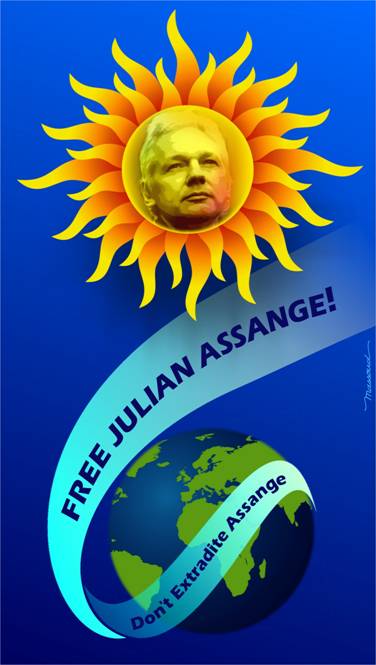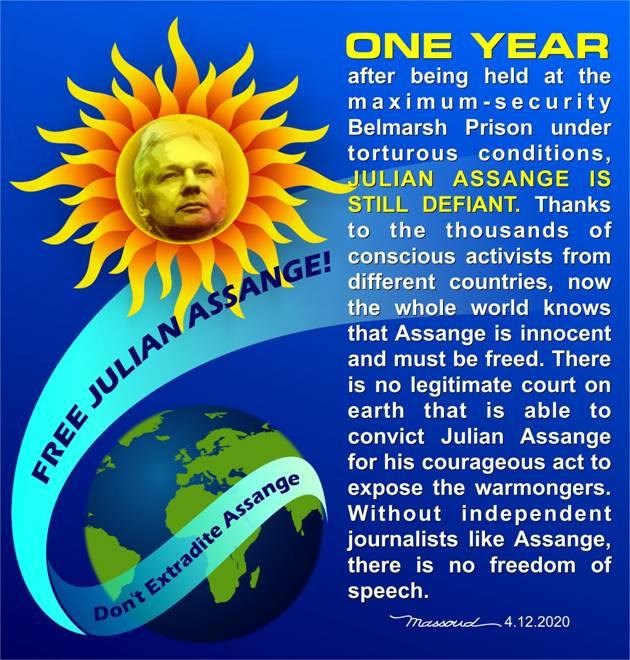A Year Since the Arrest of WikiLeaks Publisher Julian Assange

Today marks 12 months since WikiLeaks founder Julian Assange was arrested by British police and security officers after being illegally expelled from Ecuador’s London embassy, where he had lived and worked as a political refugee for seven years.
The sight of a physically-unwell journalist being manhandled by six British cops in the heart of London shocked millions of people around the world. Assange was carried from the building, wincing at his first exposure to sunlight for some time. The operation appeared to be directed by undercover officers who had been filmed skulking around the embassy for days.
Even as he was being brutalised by the police, Assange was defiant, calling for opposition to his persecution.
“The UK must resist this attempt by the Trump administration,” he declared.
Assange had been subjected to a violent attack, even before the 55 seconds of footage of his expulsion from the embassy was filmed by the sole journalist outside the building, a reporter for the Ruptly news video service.
The German program “Panorama” cited an account by an anonymous WikiLeaks staffer who had been by Assange’s side.
Assange had been called into the embassy’s conference room on the morning of April 11. Ambassador Jaime Marchan walked into the room, flanked by security guards and Ecuadorian secret service personnel. He read aloud a letter declaring that Assange’s asylum and Ecuadorian citizenship had been revoked and that he needed to exit the embassy immediately. Marchan and his security detail walked out of the room.
“Panorama” reported that when Assange and his colleague opened the door of the conference room, they “could see that a group of men and women, including members of the Metropolitan Police, were just outside, apparently waiting for him.
“Assange declared that the reversal of his asylum and citizenship were a violation of the Ecuadorian constitution, and that he wanted to appeal. He got up to return to his room.
“Assange’s assistant was shoved aside; Julian Assange was tackled, handcuffed and brought to the front door of the embassy.”
A year later, there can be no doubt that the assault last April 11 marked the beginning of an attempted US-British political assassination. Assange sits in the maximum-security Belmarsh Prison, dubbed the UK’s Guantánamo Bay, as the coronavirus pandemic sweeps through the facility.
In a phone call to his friend Vaughan Smith on Thursday night, Assange said he is held in his cell 23-and-a-half hours a day. His half hour of exercise is in a yard crowded with other prisoners. At least 150 prison staff members have either been infected with COVID-19 or are self-isolating. Assange revealed that there have been more deaths of inmates than the one admitted by prison authorities. He said the virus was “ripping through the prison.”
The WikiLeaks founder has been denied bail, despite the fact that he is on remand and is imperilled by the virus as a result of his raft of serious medical problems. Magistrate Vanessa Baraitser has even decreed that his extradition show-trial will proceed in May, despite a national lockdown, mass coronavirus deaths and Assange’s inability to consult with his lawyers.
This lawless treatment, which recalls the actions of the fascist regimes of the 20th century, and Assange’s arrest, is the culmination of a years-long campaign to destroy the WikiLeaks publisher, spearheaded by the US and supported by all its allies.
As early as 2008, the US military had prepared a secret report detailing the means that could be used to suppress Assange and WikiLeaks.
The WikiLeaks’ 2010 publications, for which Assange has now been charged—including the Collateral Murder video, the US army’s Iraq and Afghan war logs, and hundreds of thousands of damning American diplomatic cables—had been greeted with declarations by senior US political figures that Assange was a “cyber-terrorist” who needed to be “taken out.”
The Obama administration impanelled a secret Grand Jury with the aim of concocting Espionage Act charges against Assange and his colleagues. Members of Obama’s administration, including Secretary of Defense Robert Gates, publicly called on US allies to initiate criminal proceedings against Assange.
That appeal was answered by the Swedish state and judiciary, which had already collaborated in the US Central Intelligence Agency’s illegal “war on terrorism” program of extraordinary renditions. Swedish police and prosecutors fabricated sexual misconduct allegations against Assange.
One of the complainants was a prominent figure in the country’s US-aligned social-democratic party. Her lawyer, Claes Borgström, who successfully appealed the finding of the initial prosecutor that Assange had no case to answer, had been a senior official in previous Swedish governments with close ties to the US.
Contrary to all legal precedent and to domestic and international legal norms, successive British courts decreed that Assange be extradited to Sweden at the request of a prosecutor, not a judge, merely to “answer questions.” It was never explained why this questioning could not take place in London. The Swedish authorities refused to guarantee that they would not dispatch Assange to the US for prosecution over his publishing activities.
Under these conditions, Assange sought asylum in Ecuador’s London embassy on June 19, 2012. Police besieged the embassy and successive British governments declared that Assange would be arrested if he set foot outside. His status as a political refugee, however, was repeatedly upheld by the United Nations and he was able to continue his work.
The US campaign against WikiLeaks intensified in 2016, when it published evidence of Hillary Clinton’s pledges of loyalty to Wall Street and of the Democratic National Committee’s illegal subversion of the primary campaign of Bernie Sanders.
The US operation was ramped up still more in early 2017, when WikiLeaks exposed the hacking and cyberwar operations of the CIA. Then CIA director and current Secretary of State Mike Pompeo declared WikiLeaks a “non-state hostile intelligence service” and Assange a “demon.” President Correa, who granted Assange asylum in 2012, was replaced by Lenín Moreno in May 2017.
Illegal spying operations against Assange were escalated inside the embassy, including by the CIA. The US put immense pressure on Ecuador to rescind Assange’s asylum. In March 2018, Ecuador’s government responded by severing Assange’s internet access, banning him from receiving visitors and transforming the embassy into a de facto prison, before expelling him from the building a year later.
Assange’s expulsion was an historic crime, carried out in defiance of the internationally-enshrined right to political asylum. It was the high-point of an ongoing campaign to censor the internet and alternative viewpoints being conducted by governments around the world, amid an upsurge of the class struggle and immense social opposition. It marked a turning point in a protracted assault on press freedom and freedom of speech.
As the US National Security Agency whistleblower Edward Snowden wrote at the time:
“Images of Ecuador’s ambassador inviting the UK’s secret police into the embassy to drag a publisher of—like it or not—award-winning journalism out of the building are going to end up in the history books. Assange’s critics may cheer, but this is a dark moment for press freedom.”
The experiences of the past year have proven that Assange’s freedom and the defence of democratic rights cannot be taken forward through appeals to, or support for, any section of the capitalist political, media or state establishment.
The British courts have subjected him to one abuse after another. The corporate media, which has slandered Assange for the best part of a decade, now pretends that he does not exist.
Jeremy Corbyn, the former leader of the British Labour Party, was held up as the initiator of a new socialist revival. As part of his continuous capitulations to the right-wing of his own party, Corbyn refused to mount any campaign in defence of Assange and promoted the Swedish frame-up. Corbyn has departed the scene, handing the Labour leadership to Keir Starmer, who as head of the British Crown Prosecution Service, played a central role in the international political conspiracy against Assange.
In the US, Bernie Sanders, who claimed to be waging a “political revolution” inside the Democratic Party, refused to say a word about Assange. He has all but endorsed Joe Biden as the Democrats’ presidential candidate. Biden was vice president in the Obama administration which initiated the US pursuit of Assange.
In Australia, all the official parties, including Labor and the Greens, have refused to defend Assange, despite the fact that he is a persecuted Australian citizen and journalist. This is in keeping with the role of every Australian government, and the entire establishment, since 2010 in supporting the US-led vendetta against the WikiLeaks publisher.
It is clear that the fight for Assange’s freedom must be waged by the international working class, the only social force capable of mounting a struggle for the defence of all social and democratic rights.
Over the past two years, the WSWS, the International Committee of the Fourth International, and its sections, the Socialist Equality Parties around the world, have waged an unyielding campaign to defend Assange and to secure his freedom. Amid the imminent dangers to his life, we will intensify this fight over the coming months, and urge all workers, young people and defenders of civil liberties to take part.
*
Note to readers: please click the share buttons above or below. Forward this article to your email lists. Crosspost on your blog site, internet forums. etc.
All images in this article are from Massoud Nayeri


